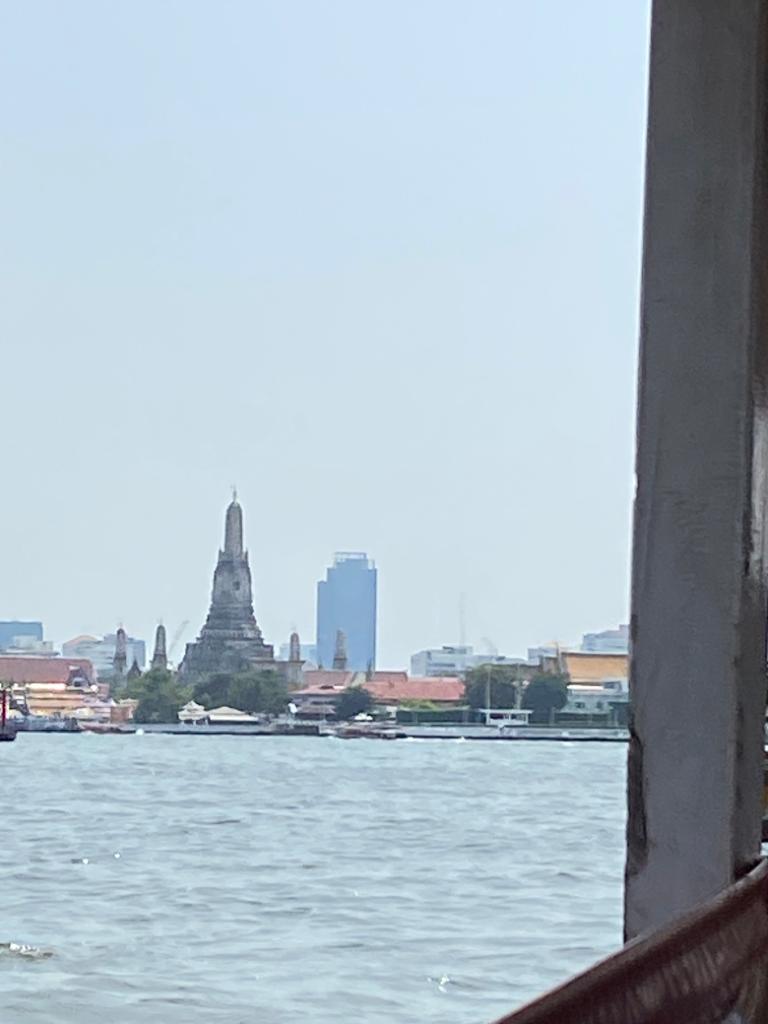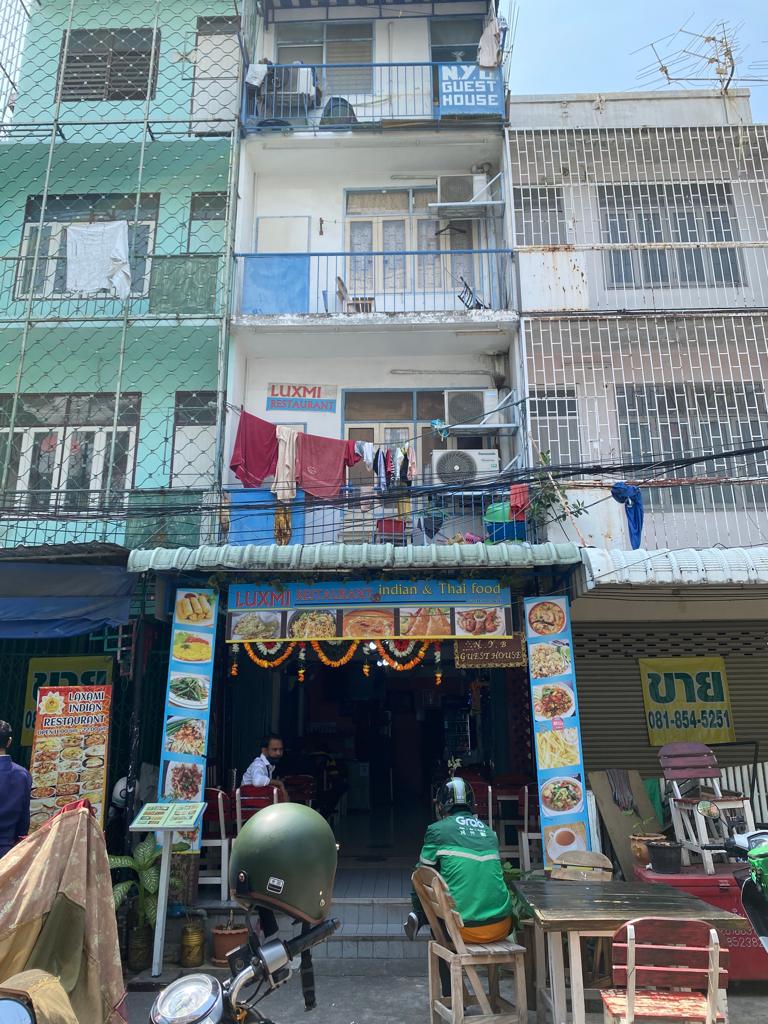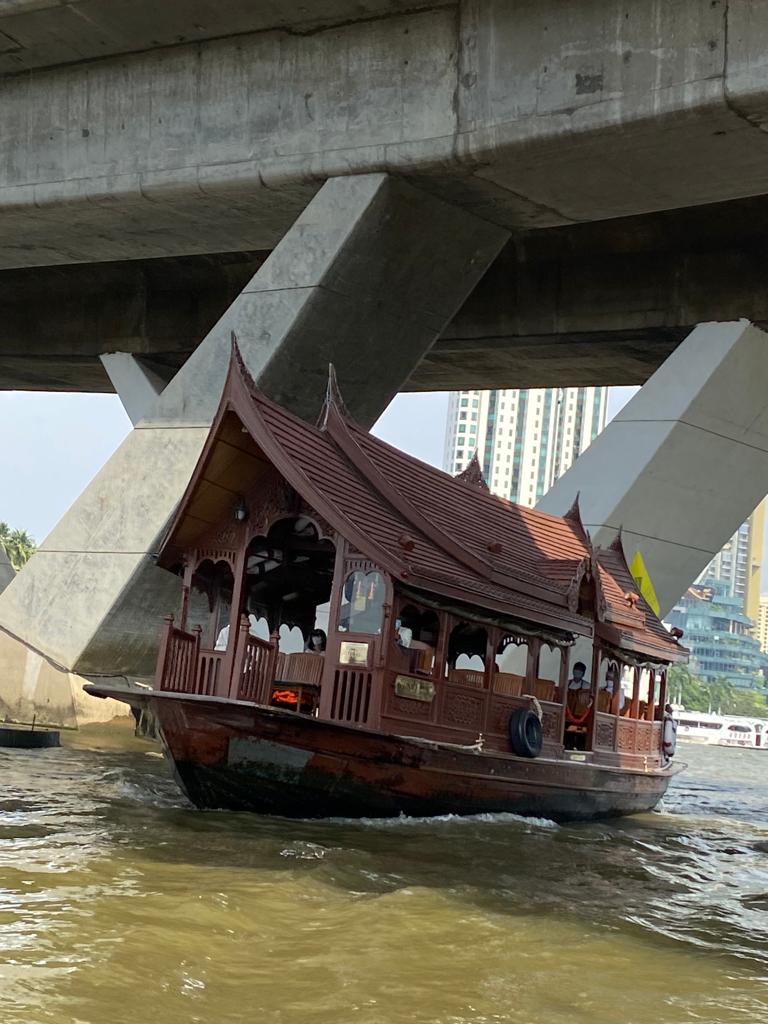I am definitely aged. Getting and taking the plane from Bangkok to Chiangmai knocked me out. I got my reservation online, but the site was so difficult that I did not print out a ticket nor did I get a seat. When I arrived at the airport, I had to do that at the Nok Air counter. It was not a problem.
I talked to two young people before and on the flight, a contrast in cultures. The first was an unusually tall, good looking, young American woman. We sat next to each other while waiting to board the plane, conversing a bit, but she was uncomfortable, as though unsure what you said to an older woman from your own culture in a foreign setting.
In contrast, on the flight I sat next to a 20 something Thai man, tall, handsome. We talked with ease. He was curious about me but not embarrassed by it. He paid me the complement of asking if I lived in Thailand.
A taxi got me to the Rich Lana House by a series of short cuts that wriggled through the back streets of greater Chiangmai outside the moated old city. At the Rich Lana, they put me on the top, the fourth, floor, no elevator. I had in one direction an exceptional view of the hills, their great, green humps barricading the horizon, a little misty, portending the Himalayas hundreds of miles away. In the other direction was the gold spire of a chedi.
The Rich Lana has a two-floor, tiny coffee house that looks across the road to the moat. The second floor has both an inside room and a balcony that I prefer. It is shaded by a tree whose trunk bursts with fountains of ferns. It has good coffee and huge flaky, crispy croissants.
M and his masseuse/taxi driver, Lak, picked me up for lunch which we had in an outdoor local restaurant. I ordered snail curry. It was like eating pencil top erasers —if you remember those. I used to eat them as a kid, so I liked the curry which came with black rice.
While we had lunch, I heard the bird one always hears here. It’s very loud with a distinctive cry. I asked Lak what bird it was. I was impressed that she knew. Often Thais know nothing about birds or animals in their vicinity except whether they are good to eat or not. It is called nok gawow and is a small bird with a big voice. Nok means bird which explains Nok Air.
I have the incredible luck to have had a student who is French and Thai. We became friends many years ago. She comes from Chiangmai and has a half-sister there whom she offered to introduce me to. So, B introduced me to V electronically.
V picked me up at the Rich Lana. I should note that the Rich Lana has beautiful rooms constructed entirely of teak—walls, ceilings, floor– with big four poster beds, comfortable chairs to sit in and good tables to write at. After we introduced ourselves—V is different both in looks and in personality from B—I could feel V pulling taut on some invisible leash, ready to take off. She asked what I was interested in. I said that I no longer had any clothes of Northern Thai fabric or with the embroidery and applique that is typical of that area. It was like slipping a grey hound’s leash after saying rabbit.
She drove to a market area of small shops. We got out and spent the next few hours dashing and darting from store to store. I now own two dress lengths of silk one printed with what I think of as the typical Thai medley of colors pink, blue and purple. The other is more unusual, a rich, brown silk hand embroidered with an abstract pattern of curving stitches in shades of cream to dark brown.
After lunch, I was dying for a nap, but I was also dying to see V’s house. I got the second. It is an exceptional, modern adaptation of the Lana house, rooms around courtyards with ferns spouting and arching in gardens embracing waterfalls and streams. It is a superbly peaceful environment. There is also a small dog who is fluffy as a little bear and sure he is the center of the universe.
The next day M picked me up in a scarlet, silk shirt perfect for Christmas, Chinese New Year and the Fourth of July. We had a Chinese lunch and talked, as happens too often at this age, of people we had both known in New York all of whom are long dead. They were odd people, neurotics, but not in any spectacular way, just peculiar enough to mess up their children’s lives.
M is less physically balanced than the last time I saw him because his trembling from Parkinson´s destroys his stability, therefore, he’s more likely to fall. He almost did one day when we were together and a half dozen pairs of hands reached out to catch him, but he recovered.
One morning I wandered in and out of wats. In one, years ago, I talked to an elderly Englishman who was feeding stray cats. As he cleaned their bowls, he said to me, “I think this is my karma, to in old age feed stray cats in a wat in Thailand.” I did not see him, nor did I see any evidence of anyone feeding strays.
The flight from Chiangmai is a chaotic procedure. You check your ticket in one place and your bags in another. The gates are jammed with people because flights leave, one immediately after another with little announcing. I sat next to an elderly German in denim cut offs, the epitome of what we all fear becoming—he forgot half his clothes at one hotel and lost his phone somewhere else along the way. He was all good cheer, but I suppose that’s part of the problem in a way. If he were upset about the losses, he might be more likely not to have them.
I did some shopping for friends at Jim Thompson in Bangkok. It is more expensive, but one goes there because the quality is absolutely reliable. The designs they come up with are mildly imaginative, which is just fine since their customer base is cautious American and European, the sort of people who would consider a pair of red silk pajamas with little rabbits hopping all over—it’s the year of the rabbit—cutely outrageous.
My friend and former dentist, N picked me up at the Anantara where I go to the gym for lunch at a restaurant near St. Louis Hospital which has tables outside under big spreading trees and tables inside in air-conditioning. We were seated inside by a window that looks onto the street. There was a man on the sidewalk with a cart selling dried squid which were hanging up in plastic bags in a row. If you bought one, he would roll it back and forth through the rollers of his mangle to soften it before giving it to you in a plastic bag accompanied by a smaller plastic bag with hot sauce in it.
We had minced pork with green beans, glass vermicelli with big garlic, also known as Chinese garlic and chicken, and round, inch long glass noodles in an unknown sauce. Absolute heaven. The deserts at this restaurant are superb but I rarely am able to leave enough space to have one.
All three of us were noddy with sleep after. It was a relief to know that N got home safely.
I am staying at an Ibis Hotel where they have a large breakfast buffet and a terrace to eat it on. The array of foods is the usual assortment of breads, cakes, cereal plus Chinese dishes, Indian dishes and rice both black and white. Your eggs are cooked to order. The coffee is good. But I love eating on the terrace, which is covered, because there is always a breeze, and you are surrounded by green bushes.
The gym I use is in the Anantara Hotel on Ratchadamri. This was once a Four Seasons Hotel and more elegant in those days but it is still a good gym with clean locker rooms. The machines work, although the TV on the elliptical will only give you CNN and even that may not have any sound. However, it is easy to get to, being right at the Ratchadamri stop on the Skytrain. Anything more elegant would be a long way away. Also, the Anantara has a small restaurant, Mocha and Muffins, which serves a crisp, finely seasoned shrimp salad I am partial to.
Today I took the Skytrain down to the river, the Taksin stop, to wait for an Express River Bus. It’s a peaceful but interesting journey upriver, both banks are spiked with tall buildings, more and more each year, the most fashionable hotels—the Mandarin Oriental, the Peninsula—the slender pyramidal tower of Wat Arun gaily adorned with designs made from broken crockery, the red roofs with up turned eaves of various monasteries, the gold spires of wats. Many new apartment buildings and old ones, including the Baan Chao Phraya where I almost bought an apartment when I thought I might live here. There is very little now that is derelict or disreputable, even in the Chinatown area. You pass under bridge after bridge, pulling in to pick up passengers at the designated piers along the way.
My old travel agent, Mr. Thai with a hand mangled by a shark, was on holiday. I will try to get back to see him.
I stopped for something to drink at an Amazon Café where I fell into travelers’ conversation with two young men, one American living in Bangkok, the other German living in Dublin. The American was trying to talk his friend into moving to Bangkok. The advantages would be many—good food, warm climate and you would be able to afford a much higher standard of living for the same salary.
I left them and walked over to my old Soi noting on the way that the old Vieng Thai Hotel is about to reopen as an Ibis Hotel. The alley to the Suneeporn is lined with food carts and the open space before it looks clean and neat but the building itself, now an Indian run guesthouse, looks shabby, deteriorating and seems to cry out “bedbugs.”
Forty years ago my friend and landlady, Sunee, ran a primitive, Spartan but hospital clean guesthouse in that space. She was a single woman who had cut herself off from her family whom she considered lazy and unreliable. She borrowed the money to buy a four story Chinese shop house which she converted into rooms with ceiling fans for backpackers. I stayed with her, and we became friends over the years. It was a Spartan place, but she ran it well and the neighborhood catered to the needs of backpackers.
She had started her commercial life by selling fruit from baskets suspended from a yoke she carried across her shoulders. She told me once, ”I save, save, save. I eat meat once a week. I get enough money to buy building.” What she really wanted besides financial independence was to travel and she did get to do a little. She never came to New York to see me, but she did get to London, Paris and Rome. She didn’t like Rome because of the way the men behaved.
But then age began to arrive, and her mind began to deteriorate. Her family stepped in. I don’t think they treated her badly. They sent her south to some relative who took care of her. For a while they kept the guesthouse. But she was right. They were not people who knew how to do things independently. They sold it. Sunee died down south somewhere. But I still go back to the neighborhood to see what has changed and to remember. Because it was here in the late 1980´s that I took my first shaky and fearful steps in learning to travel solo. Sunee was my home base.










Thanks Karen.
You have done a lot of traveling since that first trip in the ’80’s. I am glad you are doing this blog so I can follow your adventures. Last weekend I turned 80. I had three days of celebrating doing very NYC things. Richard set aside the time to share it with me. All is well here.
Love, J 0’s
LikeLike
What a beautiful tribute to Sunee. Thank you for describing her in such loving words.
LikeLike
Dear Karen:
You are as wise, perceptive and wry as ever. It’s been so long since I’ve seen you. I miss you and think of you often, fondly. But, at least I can hear your voice in your blog. Thank you for sharing it.
LikeLike